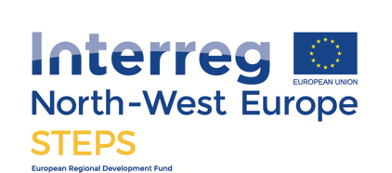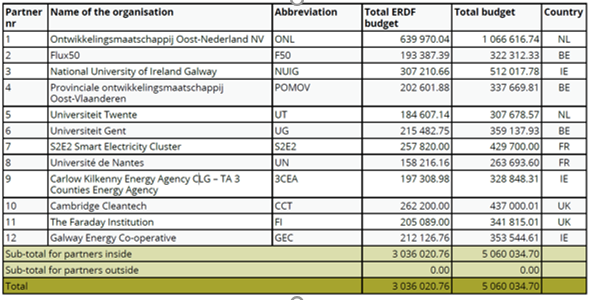Interreg North West Europe - STEPS
Introduction
Full Title: STorage of Energy & Power Systems in NWE
Summary
A business support programme for energy storage companies within North-West Europe will be developed. The STorage of Energy and Power Systems (STEPS) Business Support Programme will support small to medium-sized enterprises (SMEs) in bringing their energy storage solutions to the market. As part of the Interreg North-West Europe (NWE) programme, the STEPS project aims to strengthen the collaboration and competitiveness of businesses in the region and lead NWE to the forefront of energy storage innovation.
Project partners & budget
Coordination
Lead partner: Oost-NL
Duration
2020-2023
Project description
As the NWE is increasingly investing in distributed renewable energies (e.g. roof-mounted solar PV), the need for medium capacity energy storage solutions becomes apparent, with a market potential reaching €250bn by 2025. Heavily subsidized batteries from the US and Asia outpace EU suppliers through price-competition, and currently supply 80% of the storage market in NWE. Many of these mass-produced solutions are not tailored to the needs of local market segments including, e.g. housing providers, energy cooperatives and business parks. These use cases could benefit from tailored storage technologies, new technologies or adapted business models (e.g.Storage-as-a-Service). Innovative NWE storage products are currently stuck at TRL5/6 and face significant barriers, ranging from fragmented regulations & funding sources, limited testing abilities and unawareness of final consumers. In STEPS, business support and knowledge partners from IE, NL, BE, FR and UK will strengthen the competitiveness of NEW innovative storage providers by using a user-centric, demand-driven approach to bring products closer to market through tailored testing. Specific activities include:
- Advising >200 e-storage local SMEs on entering new markets in NWE
- Create market pull effects in NWE for new e-storage solutions by engaging with potential end-users needs and increase awareness of solution providers
- Implementing a Support Program that connects end-users with 20 providers of new e-storage solutions to increase their technological readiness level (TRL5/6 to 7) through real-life testing. More than 50 future end-user of storage will be trained on using a new tool to model their e-storage need with direct links to a portfolio of 250-300 solution providers from NWE. On the long-term, this will position NWE as a leading storage player, gaining up to the 30% of the market with more than 120 new e-storage solutions commercialised and leading to the generation of >1100 new jobs.
Objectives
These are the objectives of STEPS:
- Objective 1: Project focus
Medium-scale energy storage (20kW–2MW) solves the key problems in decentralising the energy transition: local congestion management (e.g. for network operators with flexibility needs), improved efficiency and self-consumption of RES (e.g. for a business park with 100kW solar installed). The most suitable solutions for these issues are based on chemical (e.g. hydrogen, power-to-x), electrochemical (e.g. classic and redox-flow batteries) or electrical e-storage technologies (e.g. supercapacitors) [EASE, 2019]. STEPS aims to increase the competitiveness of innovative SMEs from NWE that such solutions by addressing the key barriers in the European market:
1) New energy storage solutions take >5 years to reach pre-commercial TRL. Having access to testing sites is crucial for any SME’s pathway to commercialisation (TRL9) and to drive innovation and job creation in NWE. STEPS will give SMEs in the medium-scale e-storage sector access to suitable testbeds at potential client sites that allow them to effectively test their product’s capabilities
together with end-users and STEPS experts.
2) Each NWE country has its own energy market regulations which influence products’ technical specifications and business profitability: Technical aspects of energy storage installation (e.g. building and network codes), broader energy policies on tax codes, demand-response participation requirements influencing accessible revenue streams. Further, various access-to-finance
options affect the financial feasibility to launch products in certain markets (e.g. national & regional funding programmes). STEPS aims to explore & disseminate these frameworks to support SMEs accessing new markets in NWE.
- Objective 2: A demand-driven and effective product development process
STEPS goes far beyond conventional product testing. Currently, energy storage SMEs in NWE spend on avg. 5 years on R&D before reaching mature enough levels to engage with prospective clients to validate their product in the market. STEPS aims to streamline this development process. Three key pillars allow for creating a transnational environment in which innovative energy storage products can be developed more efficiently with maximised commercial usability and increased international
competitiveness: STEPS aims to create a unique innovation support framework that facilitates the commercialisation process of e-storage solution providers (SMEs) from NWE while catalysing customer demand. At its core, the Business Support Programme will provide selected 40 SMEs with international expertise on e-storage technology to ready their solution for real-life implementation. 20 auspicious SMEs will get the chance to test their products at potential client sites (testbeds). Further, STEPS plans to instruct >200 more on expanding to new markets in NWE (e.g. a French battery-driven demand-response provider trying to access the German market will be trained on local grid participation conditions and suitable financing options).
- Objective 3: Main outputs
1) Support 40 SMEs from NWE in e-storage innovation: 40 SMEs will be supported in product tailoring for implementation; 20 SMEs test solutions at potential client sites (testbeds), with brought close to market (TRL5 to 7). 2) Support >200 e-storage SMEs from NWE in entering new markets: Based on an analysis of energy market regulation and financing options in the STEPS countries, e-storage SMEs from NWE will be trained on entering markets in NWE beyond their own.
3) Creating market pull: End-users grouped in a transnational board to characterise their needs & ambitions to test new e-storage products on-site. In 5 countries, national user boards will be formed to aggregate >50 future e-storage to train on implementing e-storage based on STEPS experience. The STEPS e-storage modelling tool will be introduced to help find suitable e-storage configurations and solution providers from NWE.
Role of Ghent University
Ghent University will develop an e-storage modelling tool. Using technical testbed data as input, the tool will suggest appropriate energy storage systems based on (electro-)chemical and electrical technology. Testbed providers will use the initial tool in their SME selection process. Once validated, the tool will be further developed to link its outputs (suggested storage systems) with e-storage providers from the SME portfolio. The final tool is published and disseminated so that any future clients of energy storage systems will be able to find optimal technology configurations with suggestions of suitable and innovative providers from NWE. This effectively raises awareness of NWE e-storage solution providers and creates new market pull effects. The involved research team (EELAB/Lemcko) is active in the domain of the integration of RES and storage in electrical distribution networks and industry. Load demand combined with renewables and storage is one of the main points of interest due to its close relation to flexibility and load/yield estimation. Both simulation, modelling and experimental verification in our extensive lab are of major importance to study future challenges.
Dutch summary
Toename van investeringen in NWE in gedistribueerde duurzame energie (bijv. zonnepanelen) creëren behoefte aan energieopslagoplossingen met een gemiddelde capaciteit, met een marktpotentieel van 250 miljard euro in 2025. Gesubsidieerde batterijen uit de VS en Azië overtreffen de EU-leveranciers en leveren momenteel 80% van de opslagmarkt in NWE. Veel van deze massaproductie oplossingen zijn niet afgestemd op de behoeften van lokale marktsegmenten, bv. woningbouw, lokale energiegemeenschappen, bedrijvenparken. Deze use cases hebben voordeel bij op maat gemaakte opslagtechnologieën, nieuwe technologieën of andere businessmodellen (bv. Storage-as-a-Service). Innovatieve NWE energieopslagproducten blijven momenteel op TRL5/6 steken door barrières, zoals gefragmenteerde wetgeving en financieringsbronnen, beperkte toegang tot pilotsites en onbewustzijn van eindgebruikers. In STEPS zullen bedrijfsondersteunende en kennispartners van IE, NL, BE, FR en UK de concurrentiepositie van de innovatieve NWE-opslagaanbieders versterken dmv een gebruikersgerichte, vraaggestuurde aanpak om producten dichter bij de markt te brengen via op maat gemaakte tests. Activiteiten omvatten:
- Adviseren van >200 lokale e-opslag MKBs bij het betreden van nieuwe markten in NWE
- Creëren van marketpull in NWE voor e-opslagoplossingen door in te spelen op de behoeften van eindgebruikers en het vergroten van het bewustzijn van de aanbieders
- Implementeren van een ondersteuningsprogramma om eindgebruikers te verbinden met 20 aanbieders van e-opslagoplossingen om hun TRL te verhogen (TRL5/6 tot 7).
>50 toekomstige eindgebruikers zullen worden getraind met de tool om hun vraag voor e-opslag te modelleren met koppelingen naar een portfolio van >250 NWE oplossing aanbieders. Op de lange termijn zal dit NWE positioneren als een toonaangevende speler, die tot 30% van de markt zal veroveren met >120 gecommercialiseerde e-opslagoplossingen en dit zal leiden tot het genereren >1100 banen.
French summary
L’ENO investit fortement dans les énergies renouvelables réparties et le besoin en solutions de stockage moyen d’énergie grandit (potentiel marché 250MM€ d’ici 2025). Les batteries tres subventionnées des US ou d’Asie devancent les fournisseurs de l’UE grâce à des prix attractifs et répondent à 80% de demandes du marché de stockage en ENO. Beaucoup de ces solutions de
masse ne répondent pas aux besoins des marché locaux d’ENO (fournisseurs de logements, communautés énergétiques locales & parcs d’activités). Ces cas d’usages pourraient bénéficier de technologies de stockage sur mesure, de configurations techniques alternatives ou de modèles économiques adaptés (stockage à la demande). Les produits de stockage d’ENO stagnent
à TRL5/6 et rencontrent des obstacles majeurs (régulations & financements fragmentés, sites d’essai limités, méconnaissance des utilisateurs finaux & fournisseurs techniques). Avec STEPS, les organisations d’aide aux entreprises et experts de IE, NL, BE, FR & UK renforcent la compétitivité des fournisseurs de stockage d'ENO grâce à une approche centrée sur l'utilisateur et sur la demande pour accélérer la mise en vente des produits avec des essais sur mesure. Les activités comprennent:
- conseiller >200 PMEs locales de e-stockage d’entrer sur le marché d’ENO
- attirer sur le marché d’ENO de nouvelles solutions de e-stockage grâce aux demandes de potentiels utilisateurs finaux et à la prise de conscience des fournisseurs de solutions
- mettre en place un programme de soutien connectant utilisateurs finaux et 20 fournisseurs de nouvelles solutions de e-stockage afin de passer de TRL5/6 à 7.
>50 futurs utilisateurs de stockage seront formés à l’utilisation d’outil pour modéliser les besoins de e-stockage, en relation avec >250 fournisseurs de solutions en ENO. Sur long terme, l’ENO se positionne comme acteur majeur du stockage, avec jusqu’à 30% du marché et >120 nouvelles solutions de e-stockage commercialisées, créant 1100 emplois.
Website
Contact
Prof. dr. ir. Jan Desmet
Hoogleraar Elektrotechniek
Onderzoeksgroep EELAB – Lemcko
Vakgroep Elektromechanische Systemen en Metalurgische Engineering.
Universiteit Gent Campus Kortrijk
Graaf Karel de Goedelaan 34 | 8500 Kortrijk
Tel. +32 56 32 20 32
https://lemcko.ugent.be

